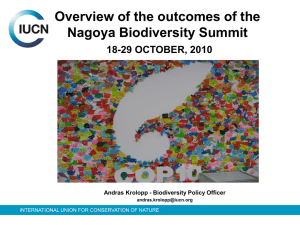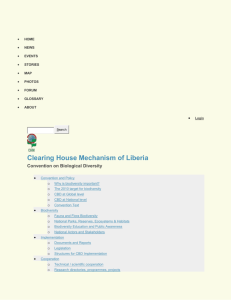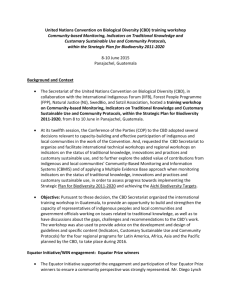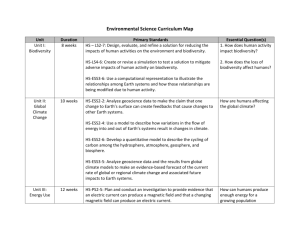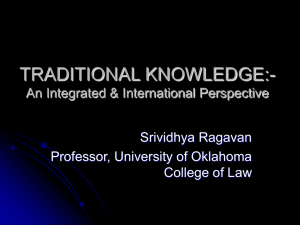United Nations Convention on Biological Diversity (CBD) dialogue
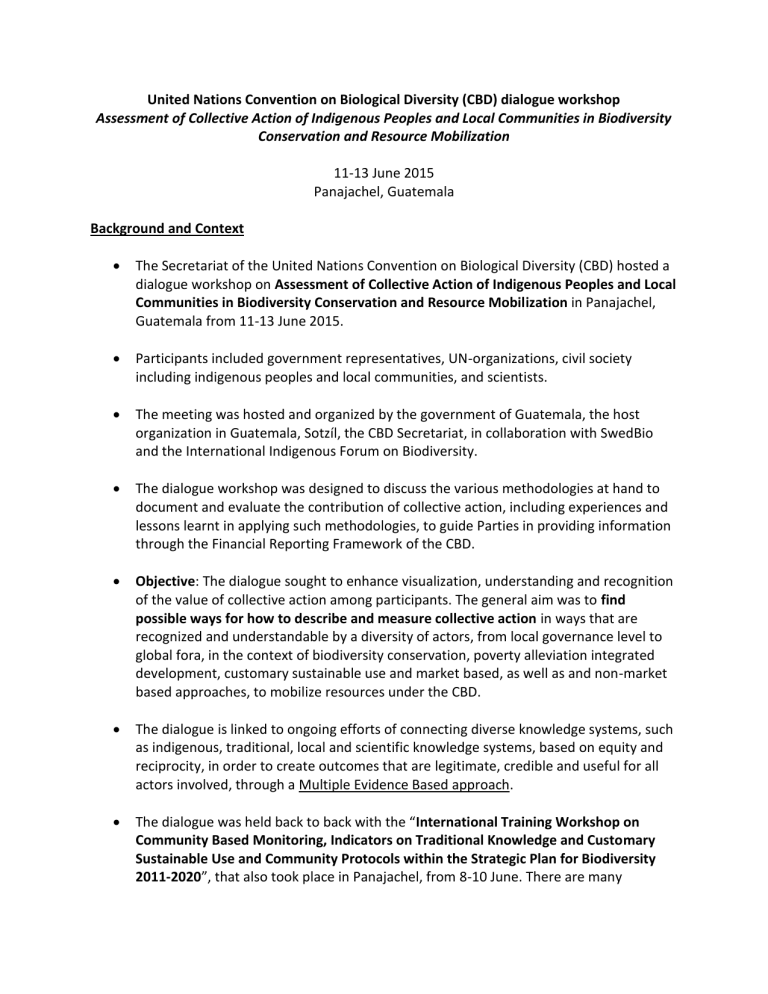
United Nations Convention on Biological Diversity (CBD) dialogue workshop
Assessment of Collective Action of Indigenous Peoples and Local Communities in Biodiversity
Conservation and Resource Mobilization
11-13 June 2015
Panajachel, Guatemala
Background and Context
The Secretariat of the United Nations Convention on Biological Diversity (CBD) hosted a dialogue workshop on Assessment of Collective Action of Indigenous Peoples and Local
Communities in Biodiversity Conservation and Resource Mobilization in Panajachel,
Guatemala from 11-13 June 2015.
Participants included government representatives, UN-organizations, civil society including indigenous peoples and local communities, and scientists.
The meeting was hosted and organized by the government of Guatemala, the host organization in Guatemala, Sotzíl, the CBD Secretariat, in collaboration with SwedBio and the International Indigenous Forum on Biodiversity.
The dialogue workshop was designed to discuss the various methodologies at hand to document and evaluate the contribution of collective action, including experiences and lessons learnt in applying such methodologies, to guide Parties in providing information through the Financial Reporting Framework of the CBD.
Objective: The dialogue sought to enhance visualization, understanding and recognition of the value of collective action among participants. The general aim was to find
possible ways for how to describe and measure collective action in ways that are recognized and understandable by a diversity of actors, from local governance level to global fora, in the context of biodiversity conservation, poverty alleviation integrated development, customary sustainable use and market based, as well as and non-market based approaches, to mobilize resources under the CBD.
The dialogue is linked to ongoing efforts of connecting diverse knowledge systems, such as indigenous, traditional, local and scientific knowledge systems, based on equity and reciprocity, in order to create outcomes that are legitimate, credible and useful for all actors involved, through a Multiple Evidence Based approach.
The dialogue was held back to back with the “International Training Workshop on
Community Based Monitoring, Indicators on Traditional Knowledge and Customary
Sustainable Use and Community Protocols within the Strategic Plan for Biodiversity
2011-2020”, that also took place in Panajachel, from 8-10 June. There are many
synergies between the decision on Resource Mobilization on collective action and decisions under 8j (on traditional knowledge) and 10c (on customary use of biological diversity).
Equator Initiative/WIN engagement: Equator Prize winners
The Equator Initiative supported the engagement and participation of four Equator Prize winners to ensure a community perspective was strongly represented. Mr. Diego Lynch represented Talamanca Initiative from Costa Rica, Ms. Celia Mahung represented Toledo
Institute for Development and Environment (TIDE) from Belize, Mr. Fredy Quintanilla represented Association Bio Itza from Guatemala and Ms. Andrea Pech represented
Koolel-Kab/Muuchkambal from Mexico.
Workshop Proceedings
The first day of the workshop, participants exchanged views of individual and collective perceptions of what collective action is.
On day 2 of the workshop, Mr. John Scott CBD Programme Officer on Traditional
Knowledge, presented on the contributions of Indigenous Peoples (IPs) and Local
Communities (LC) to biodiversity conservation, and made reference to article 8J of the
Convention on Traditional Knowledge and article 10C of the Convention on Customary
Use of Biological Resources. Mr. Yibin Xian, Senior Officer of the CBD, explained how the role of collective action is recognized in the financial reporting framework of the
CBD (under resource mobilization), and the role of collective action (including by indigenous peoples and local communities) and non-market based approaches, for mobilizing resources for achieving the objectives of the convention.
Other panelists shared their views on valuation of ecosystem services and the benefits of collective action to biological diversity. Mr. Erik Gomez Baggenthun, from the
Environmental Change Institute at Oxford University, stated that today’s economy fails to make visible many of nature’s values to human wellbeing, since the economy measures what it can attribute a monetary value to. He stressed the limits of markets and the importance of proper economic valuation for environmental justice. Mr. Thinley
Dorji, representative from Bhutan, spoke about the Gross National Happiness (GNH)
Index from Bhutan. The GNH index embraces a holistic approach towards notions of progress and gives equal importance to non-economic aspects of wellbeing. Ms.
Yolanda Teran, indigenous representative from Ecuador, explained how indigenous peoples have practical knowledge and values about ecological management of biodiversity that is passed from generation to generation. And Mr. Valentin Daroberto,
leader from the 48 Cantons of Totonicapán, spoke about the centuries-old Maya-
Quiché governing body responsible for managing the natural resources of the villages surrounding the Los Altos de San Miguel forest.
Participants also discussed methods for measuring and aggregating data related to collective action. Ms. Pernilla Malmer, from SwedeBio, talked about the different Aichi targets and the importance of using multiple-evidence based approaches in assessments that include both traditional knowledge and scientific knowledge. Mr. Gathluru Mburu,
from Kenya, presented on eco-cultural mapping for mobilization of knowledge for the recovery of the Kathita River. Ms. Carmen Miranda, from the ICCCA Consortium highlighted the methods and tools used by the Indigenous People and Community
Conserved Territories and Areas (ICCAs) for documenting and visualizing Indigenous
Peoples and Local Communities’ contribution to biodiversity conservation. Ms. Celia
Mahung from TIDE, Equator Prize winner from Belize, spoke about the work of the
Toledo Institute for Development and Environment on governance and local biodiversity, focusing on the co-management arrangement to sustainably manage the fisheries in Port Honduras Marine Reserve amongst multiple stakeholders.
Mr. Mauricio Ferrari from Forest Peoples Programme (FPP) presented on FPPs work comparing experiences on customary sustainable use of biological resources (which is the focus of CBD Article 10(c)), and data aggregation. Mr. Beau Austin, from the
Research Institute for the Environment and livelihoods at Charles Darwin University, explained how cultural mapping can improve the global evidence base of the contributions of Indigenous Peoples and Local Communities to biodiversity conservation. Mr. Pedro Constantino from Brazil spoke about scaling up local community based biodiversity monitoring, referencing a Brazilian community-based participatory monitoring model that was scaled-up to the national level.
Following an exchange of views amongst delegates on methods for data aggregation at different scales (including bottom-up and top-down approaches), Mr. Yibin Xian, Senior
Officer of the CBD, presented on the importance of resource mobilization for biological diversity and about the CBD signatory countries’ obligation to report on their domestic biodiversity expenditures-- including on collective action of indigenous peoples and local communities as a non-market approach for resource mobilization Ms. Viviana Figueroa,
from the CBD, spoke of target 18 (on traditional knowledge) and article 20 (on resource mobilization) of the Aichi Biodiversity targets and reiterated the importance of the 4 indicators on traditional knowledge: status and trends in traditional languages, status and trends in traditional occupations, changes in land use and security of land tenure on traditional territories, and participation of indigenous and local communities in the revision of the NBSAPs (National Biodiversity Strategy and Action Plans).
Dr. Oscar Villagram then talked about BioFin: the Biodiversity Finance Initiative, a new global partnership seeking to address the biodiversity finance challenge– building a case for increased investment in the management of ecosystems and biodiversity–with a particular focus on opportunities at the national level. Mr. William Dunbar, from UN
University Institute for the Advanced Study of Sustainability, spoke of the Satoyama
Initiative, a partnership dedicated to working together to realize societies in harmony with nature through mainstreaming biodiversity into production landscapes and
seascapes; and about indicators of resilience in socio-ecological production landscapes and seascapes. The last session of the day delegates were separated into working groups to discuss indicators for collective action, as they relate to the financial resources framework.
The last day of the workshop began with a half-day field trip to San Jose la Laguna, also in the Atitlan Lake. Delegates learned about organic coffee and avocado plantations; home gardens; local varieties of maize and cotton; traditional weaving; the community elders and traditional food. Delegates exchanged best practices with representatives of the community and were hosted for a rich lunch prepared by the local community.
The last session of the workshop focused on reporting knowledge acquired during the field trip, and on how to proceed with diverse methodologies for CBD reporting
frameworks (including on financial resources).
Conclusion
At the end of the workshop, there was general consensus of the need to value traditional knowledge and collective action and its contributions to the conservation of biological diversity, as well as the need to focus on the non-monetary value of nature and ecosystem services. There was also an understanding that to strengthen the collective action among indigenous peoples and local communities, as a contribution to biodiversity governance, can contribute substantially to the implementation of the
Strategic Plan, and ultimately towards reaching the Aichi Targets.
